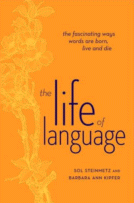Lifestyle Book Reviews
Page One of TwoThe Hidden Gifts of the Introverted Child: Helping Your Child Thrive in an Extroverted World by Marti Olsen Laney
Workman Publishing Company, December, 2005Paperback, 256 pages
ISBN: 0761135243
Ordering information:
Amazon.com
 Every parent takes pride in the extroverted child, and loves to explain how their child has never shied away from making friends. But the introverted child is the child that parents most often find themselves trying to explain to others. The introverted child often puzzles not only parents and teachers, but other children as well. Parents find themselves making excuses for behavior they either explain as shyness or secretly hope the child will grow out of. Dr. Laney, who admits to being an introvert herself, firmly introduces us to not only to the introverted child, but also gives us a deeper appreciation for the introverted adults with whom we come in contact.
Every parent takes pride in the extroverted child, and loves to explain how their child has never shied away from making friends. But the introverted child is the child that parents most often find themselves trying to explain to others. The introverted child often puzzles not only parents and teachers, but other children as well. Parents find themselves making excuses for behavior they either explain as shyness or secretly hope the child will grow out of. Dr. Laney, who admits to being an introvert herself, firmly introduces us to not only to the introverted child, but also gives us a deeper appreciation for the introverted adults with whom we come in contact.
Dr. Laney begins with an insightful explanation of what an introverted child is and what they are not. Introversion is not another word for shyness or bashfulness. The reactions of the introvert and of the shy child to the world could not be more different. Although the shy personality is mostly worried that people will not like him, the introverted personality draws strength from inside and can become exhausted from social situations. The extroverted person, on the other hand, draws energy from being in the company of others. Just to make things more complex, Dr. Laney also notes that extroverted personalities can be shy, and introverted personalities can also be shy. She has done extensive research into the problem and has come up with very helpful checklists for ascertaining just what makes up an introverted child and what does not.
According to Dr. Laney's research, the introvert and the extrovert simply have brains that are wired differently. Each child will be that way for life. There is no way to change the pathways of the two different brains. The good news is, she points out, that both types of personalities are completely normal even though they may respond to the same situation in completely different ways. The key to making things turn out well, she points out, is to understand not only the child but one's own mental style.
Some of the most intriguing research that Dr. Laney explains is the relationship between brain chemistry and neurotransmitters that make up different personalities. As she points out, a child's inherited genes encode the formulas that make up the relationships between brain chemicals and neurotransmitters. She explains that whereas most of us share 99.9% of these formulas, it is the .1% that makes all the difference.
If, then, our minds are controlled by heredity and the brain chemistry that we have inherited, the question may arise in the mind of the parent whether they can have any real or lasting influence. To this problem of nurture versus nature Dr. Laney points out that how we raise an introverted child makes all the difference. Helping an introverted child achieve a successful adulthood depends on how we guide that child to relate to the complexities of life and to who they are. Dr. Laney states that the relationship of nature to nurture is clearly fifty-fifty and that this is supported by current neurological research. Armed with this encouraging information, parents can be confident that they will make a huge difference in the life of the child.
Having established that the parent, teacher, or grandparent (yes, grandparent) will make a significant difference in the child's life, Dr. Laney presents extensive psychological techniques to help the child at home, with siblings, in sports and at school. She explores not only these different environments, but the changes that occur as the child matures. The most valuable lessons she teaches are how to appreciate and recognize the mind of the introvert. She gives lists of how to prepare the introverted child for success in a world that appears only to appreciate the extrovert. When the reader finishes this book, a new appreciation for a great many human beings will be the result.
The Hidden Gifts of the Introverted Child is a book that will inform parents, but which should be read by teachers and all people who work with children. Adults will find themselves reviewing their own childhoods with new knowledge and understanding.
--Sarah Reaves White
The Life of Language by Sol Steinmetz and Barbara Ann Kipfer
Random House, July, 2006Trade paperback, 388 pages
ISBN: 0375721134
Ordering information:
Amazon.com
 Recognized lexicographers Sol Steinmetz and Barbara Ann Kipfer have collaborated
on a fascinating new study of words, expressions, and their origins in a fascinating
study. Sol Steinmetz has published and contributed to thirty five dictionaries and
reference books which includes the Oxford Companion to the English Language.
Currently he is a language consultant to the Oxford English Dictionary.
Ms. Kipfer is not only the author of more than 30 books but is also the
editor of Roget's International Thesaurus and The Dictionary of American Slang.
In addition she is chief lexicographer and managing editor of Dictionary.com and
Thesaurus.com.
Recognized lexicographers Sol Steinmetz and Barbara Ann Kipfer have collaborated
on a fascinating new study of words, expressions, and their origins in a fascinating
study. Sol Steinmetz has published and contributed to thirty five dictionaries and
reference books which includes the Oxford Companion to the English Language.
Currently he is a language consultant to the Oxford English Dictionary.
Ms. Kipfer is not only the author of more than 30 books but is also the
editor of Roget's International Thesaurus and The Dictionary of American Slang.
In addition she is chief lexicographer and managing editor of Dictionary.com and
Thesaurus.com.
Those of us who use words cannot help being interested in them. Where did they originate? Do they say what I want to say? Steinmetz and Kipper not only discuss the origins of words, but they have investigated changes over time and from population to population. If the word dog still means dog in English, why have the words gay and cool changed so rapidly? Why is luggage to Shakespeare anything heavy that we have to carry, or lug, and to modern people something to hold what one may need to use or wear on a trip of several days away from home?
According to the authors, words come into our language from many different sources: travel, food and invention, to name a few. The well known story of the mathematician's young nephew who delivered the word "googol" to signify ten to the one hundredth power is a case in point. We all have watched this invented word morph into the name for a search engine and now become a verb. If you want to know the answer to a question, most of us will "google" it, much to the horror of Google's trademark attorneys. According to Steinmetz and Kipfer, the word "quark" was born from the mind of Murray Gell-Mann, a particle physicist, who lifted it from James Joyce's Finnegans Wake. It is possible, they surmise, that Joyce located it as a German slang word meaning a small thing, trifling, rubbish. Mr. Steinmetz and Ms. Kipfer delight the reader with stories about words we thought were English from the beginning, yet have quite different origins.
The chapter entitled abbreviations and acronyms will be interesting to most readers, as it drags them through the bewildering verbal shorthand of a technological world. Some acronyms will remain thankfully buried within various professions. Others will remain to confuse us and still others may, one hopes, fade away as times change. The Life of Language will entertain, enlighten, and enthrall any reader who enjoys the company of words. So full of information, it would be an entertaining companion during a long trip. It would also make a handy desk companion to be dipped into in small increments over time.
--Sarah Reaves White
Return to the August 2006 issue of The IWJ.
More from Writers Write
